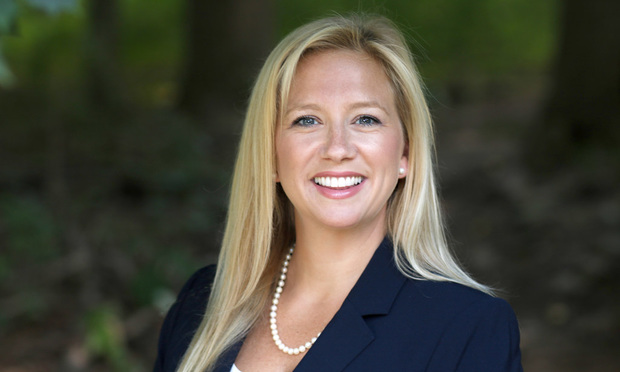World's Leading Companies Take Stand in Support of Diversity
On July 3, 206 of the world's leading companies (representing 7 million workers and $5 trillion in revenue) joined an amicus brief to urge the U.S. Supreme Court to apply federal job discrimination protection under Title VII of the 1964 Civil Rights Act to sexual orientation and gender identity in three LGBTQ discrimination cases.
November 08, 2019 at 12:56 PM
4 minute read
 Melissa Merkel, vice president and associate general counsel for Aramark
Melissa Merkel, vice president and associate general counsel for Aramark
Diversity is essential to the success of an organization, but are companies willing to look beyond the numbers game and take a public stand on diverse issues on a national level? The answer should be yes.
On July 3, 206 of the world's leading companies (representing 7 million workers and $5 trillion in revenue) joined an amicus brief to urge the U.S. Supreme Court to apply federal job discrimination protection under Title VII of the 1964 Civil Rights Act to sexual orientation and gender identity in three LGBTQ discrimination cases. Currently, Title VII bars discrimination based on sex, race, color, national origin and religion, but does not specifically address sexual orientation or gender identity.
The amicus brief argues that nondiscrimination and inclusion at a federal level are actually good for business and improve operations. So how do the arguments made in the amicus brief translate into realistic and obtainable goals for an organization?
Modern companies looking to succeed in today's marketplace recognize that a diverse employee base is representative of society at large. A key factor in delivering on an organization's economic success is to attract and retain great talent. In order to achieve a productive and diverse workforce, one must engage talent in a variety of methods that are inclusive and comprehensive. Targeted recruiting strategies ensure the ability to attract the broadest, most qualified candidate pool. Partnering with organizations like Philadelphia Diversity Law Group not only provide the organization with a diverse candidate base for employment, it provides insight into why diversity and inclusion is so important and allows the organization to remain current with cultural initiatives or social and economic issues. Encouraging a network of diverse current employees to help recruit new employees by utilizing a robust referral program is also a great way to obtain diverse talent.
Recruiting and developing great diverse talent leads to a more productive, loyal workforce and a broader client base. Have you ever been in a meeting where the diversity of the participants drove great conversation, insight and innovation? How does an organization encourage these types of interactions?
One of the multiple employee programs that can be used to advance diversity and inclusion is the creation of Employment Resources Groups or ERGs. ERGs are typically made up of volunteer employees who share a common interest, background or demographic factor and their allies to act as a conduit for its individual members to network and drive business results through the collective efforts of the group. ERGs are able to educate and support both the organization and the broader global corporate environment on subject matters and ideas that are important to creating an inclusive environment for the organization's employees. The Aramark PRIDE ERG was the driving force behind Aramark's support for the amicus brief mentioned above as well as the amicus brief filed in 2015 by Aramark and almost 250 other businesses supporting marriage equality.
Organizations can develop more formalized programs, such as a diversity advisory board that includes executive sponsorship, and other resources available to foster professional development, training/education and mentoring opportunities associated with diversity. These programs should be available to the entire employee base, and include various ways and access to the materials (emails, internal website, hard copies at local locations, etc.) and versions in multiple languages depending on the employee population.
Strong leadership and empowerment for employees to drive these ideas create a natural "right to win" and a sustainable competitive advantage with current and potential clients. Especially in a service industry where client understanding and alignment is crucial for a successful relationship, those employees play a vital role in winning and maintaining business in a global marketplace. Open dialogue and formal feedback from clients strengthen these relationships and fosters conversation on diversity and inclusion. Examples of tools for an open dialogue and formal feedback include client advisory committees, client operational reviews, consumer surveys, etc.
Overall, diversity and inclusion are critical to business success within corporate America and organizations will benefit from incorporating these concepts into their internal practices and through formal support of legal efforts intended to continue progress in this area.
Melissa Merkel is vice president and associate general counsel for Aramark. Merkel is a board member of the Philadelphia Diversity Law Group and member of Aramark Women's Business Resource Network.
This content has been archived. It is available through our partners, LexisNexis® and Bloomberg Law.
To view this content, please continue to their sites.
Not a Lexis Subscriber?
Subscribe Now
Not a Bloomberg Law Subscriber?
Subscribe Now
NOT FOR REPRINT
© 2025 ALM Global, LLC, All Rights Reserved. Request academic re-use from www.copyright.com. All other uses, submit a request to [email protected]. For more information visit Asset & Logo Licensing.
You Might Like
View All
Law Firms Look to Gen Z for AI Skills, as 'Data Becomes the Oil of Legal'

De-Mystifying the Ethics of the Attorney Transition Process, Part 2
Trending Stories
- 1Houston Law Firm Files $250K Breach of Contract Suit Against 2 Former Lawyers
- 2The Week in Data Feb. 3: A Look at Legal Industry Trends by the Numbers
- 3Mass Tort Cases: Challenges for Plaintiff’s and Defense Counsel
- 4Litigator of the Week Runners-Up and Shout-Outs: Davis Wright Tremaine, Wilmer and More
- 5Forum Clause Axes $844M Case Against Reinsurer Over Deadly Plane Crash, Judge Rules
Who Got The Work
J. Brugh Lower of Gibbons has entered an appearance for industrial equipment supplier Devco Corporation in a pending trademark infringement lawsuit. The suit, accusing the defendant of selling knock-off Graco products, was filed Dec. 18 in New Jersey District Court by Rivkin Radler on behalf of Graco Inc. and Graco Minnesota. The case, assigned to U.S. District Judge Zahid N. Quraishi, is 3:24-cv-11294, Graco Inc. et al v. Devco Corporation.
Who Got The Work
Rebecca Maller-Stein and Kent A. Yalowitz of Arnold & Porter Kaye Scholer have entered their appearances for Hanaco Venture Capital and its executives, Lior Prosor and David Frankel, in a pending securities lawsuit. The action, filed on Dec. 24 in New York Southern District Court by Zell, Aron & Co. on behalf of Goldeneye Advisors, accuses the defendants of negligently and fraudulently managing the plaintiff's $1 million investment. The case, assigned to U.S. District Judge Vernon S. Broderick, is 1:24-cv-09918, Goldeneye Advisors, LLC v. Hanaco Venture Capital, Ltd. et al.
Who Got The Work
Attorneys from A&O Shearman has stepped in as defense counsel for Toronto-Dominion Bank and other defendants in a pending securities class action. The suit, filed Dec. 11 in New York Southern District Court by Bleichmar Fonti & Auld, accuses the defendants of concealing the bank's 'pervasive' deficiencies in regards to its compliance with the Bank Secrecy Act and the quality of its anti-money laundering controls. The case, assigned to U.S. District Judge Arun Subramanian, is 1:24-cv-09445, Gonzalez v. The Toronto-Dominion Bank et al.
Who Got The Work
Crown Castle International, a Pennsylvania company providing shared communications infrastructure, has turned to Luke D. Wolf of Gordon Rees Scully Mansukhani to fend off a pending breach-of-contract lawsuit. The court action, filed Nov. 25 in Michigan Eastern District Court by Hooper Hathaway PC on behalf of The Town Residences LLC, accuses Crown Castle of failing to transfer approximately $30,000 in utility payments from T-Mobile in breach of a roof-top lease and assignment agreement. The case, assigned to U.S. District Judge Susan K. Declercq, is 2:24-cv-13131, The Town Residences LLC v. T-Mobile US, Inc. et al.
Who Got The Work
Wilfred P. Coronato and Daniel M. Schwartz of McCarter & English have stepped in as defense counsel to Electrolux Home Products Inc. in a pending product liability lawsuit. The court action, filed Nov. 26 in New York Eastern District Court by Poulos Lopiccolo PC and Nagel Rice LLP on behalf of David Stern, alleges that the defendant's refrigerators’ drawers and shelving repeatedly break and fall apart within months after purchase. The case, assigned to U.S. District Judge Joan M. Azrack, is 2:24-cv-08204, Stern v. Electrolux Home Products, Inc.
Featured Firms
Law Offices of Gary Martin Hays & Associates, P.C.
(470) 294-1674
Law Offices of Mark E. Salomone
(857) 444-6468
Smith & Hassler
(713) 739-1250







